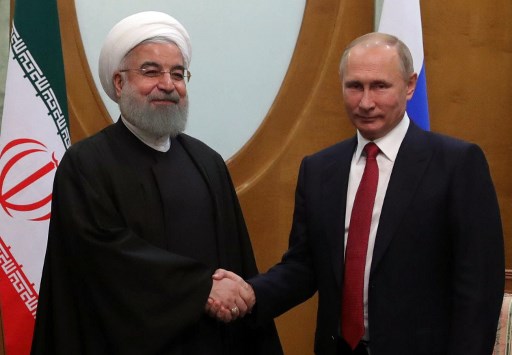
by Maria Panina
Agence France-Presse
SOCHI, Russia (AFP) — Russian President Vladimir Putin said Wednesday that efforts to end Syria’s six-year war were entering “a new stage” ahead of a planned meeting of Syrian government officials and opposition leaders, warning both sides that compromise would be necessary.
The new talks should happen soon, Putin said after a summit with Iran’s President Hassan Rouhani and Turkish leader Recep Tayyip Erdogan, insisting that they would reinvigorate a hobbled peace process.
“It is obvious that the reform process will not be simple, it will require compromise and concessions from all parties, including obviously the Syrian government,” Putin said after two hours of talks with Rouhani and Erdogan in the Black Sea resort of Sochi.
The government of Syrian President Bashar al-Assad appeared to endorse Putin’s call for a “congress” of regime and opposition figures, with a foreign ministry source telling the country’s SANA news agency that it “welcomes the closing statement.”
Opposition groups were gathered in Riyadh on Wednesday in an attempt to forge a unified delegation for talks, which Damascus has long demanded.
Even though some of the more hard-line figures stayed away from Riyadh, unwilling to drop their demand for Assad’s departure, it was unclear if the effort sponsored by Staffan de Mistura, the UN’s Syria envoy, and Saudi Foreign Minister Adel al-Jubeir would succeed.
But Putin said the coming meeting in Sochi would be a “stimulus” for the UN peace talks in Geneva, which have stalled despite numerous rounds.
He added that there was a “real chance” to end Syria’s war, which monitors say has killed more than 330,000 people.
Shifting stances?
Russia claims credit for more or less ending the military conflict through its intervention but Western governments have accused it of carrying out war crimes, including the bombing of hospitals.
Past negotiations sponsored by Russia, Iran and Turkey in the Kazakh capital Astana that brought together regime and opposition representatives led to the creation of four “de-escalation zones” that produced a drop in violence.
The countries’ leaders agreed to call on regime and opposition parties to “participate in the Congress of Syrian national dialogue in Sochi in the near future,” a joint statement said.
The date and precise list of invitees remains to be decided, though Putin had discussed Syria with US President Donald Trump and Saudi Arabia’s King Salman, among other leaders, ahead of Wednesday’s summit.
Syria is divided between forces loyal to Kremlin-allied strongman Assad, the US-backed Syrian Democratic Forces (SDF) and several jihadist groups and rebel units.
With regime forces having gained the upper hand on the battlefield with Russia’s help, including recent victories against the Islamic State group and a new drive against rebels near Damascus, Putin is hoping the timing is right after years of failed peace bids.
Moscow, Ankara and Tehran are now cooperating with increasing intensity on ending the civil war, even though Turkey backs the rebels, at odds with Russia and Iran, and fiercely opposes any participation by Kurdish Popular Protection Units (YPG) in the talks.
Russian Foreign Minister Sergei Lavrov said he expected that the withdrawal of Riad Hijab, who stepped down as leader of the Saudi-backed opposition High Negotiations Committee (HNC) ahead of the Riyadh talks, and other hardliners would “help the Syria-based and foreign-based opposition unite on a constructive basis”.
And Assad himself, meeting with Putin earlier this week in Sochi, claimed he was ready to move forward on the talks.
“We don’t want to look back and we are ready for dialogue with all those who want to come up with a political settlement,” Assad said, according to translated comments.
‘Optimistic’
De Mistura said he would travel to Moscow on Thursday for talks with Russian officials ahead of the new round of UN-brokered peace talks set to open in Geneva next Tuesday.
“I’m always optimistic… especially in this moment,” he said.
Multiple rounds of talks hosted by the UN have failed to make a breakthrough, however. Other initiatives, including those spearheaded by Moscow, have also failed to bear much fruit.
Analysts said an overhaul of the opposition forces could result in a greater willingness to compromise, in particular on Assad’s ouster.
“The Saudi pitch to the Syrian opposition has been that denial will only make the situation worse, and that they have to rethink their strategy,” said Hassan Hassan, a fellow at the Tahrir Institute for Middle East Policy in Washington.
© Agence France-Presse








